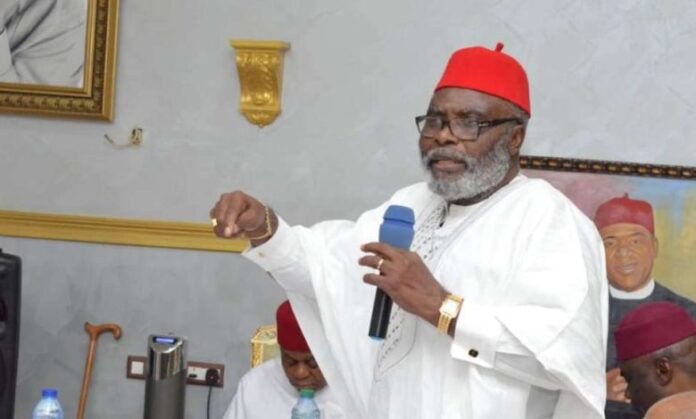Former Senate President, Adolphus Wabara, has strongly condemned the life imprisonment handed down to the leader of the Indigenous People of Biafra (IPOB), Nnamdi Kanu, by the Federal High Court in Abuja. Wabara described the ruling as a deep injustice, saying it was not only Kanu who had been imprisoned, but “the entire Igbo race.”
On Thursday, Justice James Omotosho sentenced Kanu to life imprisonment after finding him guilty on all terrorism-related charges brought by the Federal Government. The judgment has drawn reactions from political leaders, activists, lawyers, and members of the public, especially from the South-East where Kanu has a large following.
In his reaction, Wabara said the judgment represented a broader attack on the Igbo people, who he believes have long complained about marginalisation in the Nigerian system. He said the ruling sent a troubling message about how the government addresses political agitation from different regions.
“This is not about Kanu alone. It is the entire Igbo race that they have imprisoned for life,” the former Senate President said.
Wabara added that many Igbo people saw Kanu as a voice speaking up against injustice, inequality, and unfair treatment of the South-East. According to him, the heavy sentence shows that the concerns raised by the region are not being treated fairly.
One of Wabara’s strongest criticisms was the comparison between Kanu’s life sentence and a lighter sentence given to a Boko Haram leader just one day earlier. According to him, it was shocking that someone linked to violent insurgency received only five years, while Kanu, who he described as a “non-violent activist,” was given life imprisonment.
He argued that such differences in sentencing raise serious questions about fairness and consistency in Nigeria’s justice system.
“How can a Boko Haram leader be sentenced to only five years, and Kanu, a man who has never taken up arms, gets life? What kind of message is this sending?” he asked.
He said the treatment of Boko Haram fighters, many of whom have been rehabilitated or reintegrated into society shows a clear imbalance in how justice is applied.
“The law they apply for the Igbos is not the same as for other Nigerians. The real terrorists are being rehabilitated and reintegrated, while peaceful IPOB members face harsh sentencing for legitimate demands,” he added.
Nnamdi Kanu has been at the centre of Nigeria’s separatist debate for years. As the leader of IPOB, he has campaigned for the creation of an independent Biafra Republic, arguing that the South-East has been politically and economically marginalised since the end of the Nigerian Civil War.
Kanu’s broadcasts and speeches, especially through Radio Biafra, gained massive support among young people in the region. However, the Federal Government accused him and IPOB of inciting violence, enforcing illegal “sit-at-home” orders, and supporting attacks on security agents.
IPOB was declared a terrorist organisation in 2017. Kanu was first arrested in 2015, released on bail in 2017, and later fled the country during an operation at his home. He was re-arrested in 2021 and has since faced terrorism charges, which he repeatedly denied.
Despite the court’s ruling, Wabara said he remains hopeful that the judgment will be overturned. He stressed that Kanu’s legal team will go to the Court of Appeal and, if necessary, the Supreme Court.
“The judgment will surely be appealed. And we hope that the Court of Appeal or even the Supreme Court will correct this injustice,” he said.
He added that many prominent Igbo leaders and groups would continue to call for fairness, dialogue, and political solutions instead of what they see as punitive measures.
Kanu’s sentencing has stirred intense reactions across the South-East, a region already dealing with security challenges, economic disruptions, and frequent clashes between security agencies and armed groups.
Some residents say they fear the judgment may deepen feelings of exclusion, while analysts warn that it may further complicate efforts to restore lasting peace in the region. Community leaders have advised that the government should combine legal processes with political engagement and address the long-standing complaints about marginalisation.
Wabara’s comments add to a growing list of voices calling for a more balanced approach in handling the IPOB issue. Many argue that dialogue remains the best path forward, especially as military and security efforts have not fully resolved the tension in the region.
The former Senate President said Nigeria cannot build peace if different groups feel they are treated unequally under the law. He urged the Federal Government to review how terrorism cases are handled and to ensure that justice is applied consistently across all regions and ethnic groups.
“Justice must be the same for all Nigerians, whether Igbo, Hausa, Yoruba, or any other group. Once people begin to feel targeted or unfairly treated, unity becomes harder to achieve,” he concluded.

